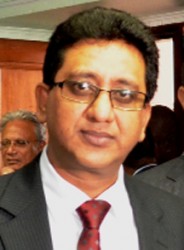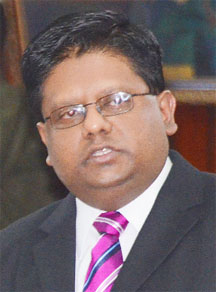Opposition Leader David Granger has moved to the High Court to stop all government spending on programmes that were not approved in this year’s national budget or not authorised by the National Assembly.
Granger has asked the court to declare spending by Finance Minister Dr Ashni Singh and other ministers designated by President Donald Ramotar on programmes disapproved or not authorised by the National Assembly to be unlawful and to grant a conservatory order to stay any further spending until the case is settled.
The move comes in wake of persistent concerns by the opposition about government spending, which have been heightened due to the absence of any parliamentary scrutiny after Ramotar’s decision to suspend the Parliament.
In an invited comment last evening, Granger told Stabroek News that the decision to challenge the spending in court was taken by APNU’s cabinet to guard against “plundering of the funds” by the administration. “We have not had parliament in five months so there has been no scrutiny. This is intended to prevent mischief,” he said.
Attorney Basil Williams, who is part of Granger’s legal team, told Stabroek News that the matter will come up on Monday morning before acting Chief Justice Ian Chang for hearing on the application for the conservatory order to stay all spending or any further spending by Singh or other ministers on programmes disapproved or not authorised by the National Assembly until the hearing and determination of the substantive action.
Granger says in the affidavit for the application that the majority of the Guyanese people who are represented by him would “suffer harm, damage and injustice,” if the order sought is not granted.
In the action, filed on Thursday, Granger was listed as the plaintiff, while Singh, the Attorney General Anil Nandlall and Speaker Raphael Trotman were named as the defendants.
Nandlall told Stabroek News yesterday that he received notice of the action on Thursday and has since entered an appearance in the case. “I am not unduly worried about the proceedings. In my view the issues are matters that are trite,” he said.
Justice Chang had ruled earlier this year that the National Assembly’s power is limited to either giving or withholding approval to the Finance Minister’s estimates of expenditure, but the government has maintained that the opposition’s disapproval of key allocations during the consideration of the estimates was unlawful. The administration has also been relying on Justice Chang’s previous interim ruling in the case to restore allocations that were cut by the opposition in the two previous years and disapproved this year. It was Singh’s expenditure in this manner that mainly prompted the AFC to bring a no-confidence motion against the government for a debate and vote in the House, which led to Ramotar’s decision to suspend the Parliament on November 10. He has since said elections would be held next year.
‘Dictatorship’



According to the indorsement of claim, apart from the conservatory order Granger is seeking a declaration by the court that the National Assembly lawfully disapproved programmes with allocations totaling $36,756,134 for 2014. He is also asking for a declaration that Singh or other ministers designated by the President unlawfully spent or authorised the spending of monies on the programmes, to the tune of $4,553,761,991, for the period ending June 16th, 2014, in breach of Articles 217 and 219 (2) of the Constitution and the decisions of the National Assembly to disapprove the programmes.
In addition, he has asked for declarations that the purported spending by Singh or other ministers on the programmes was “unconstitutional, ultra vires, null and void, unreasonable” and in breach of the doctrine of the separation of powers, and that Singh or other ministers cannot lawfully spend or authorise the spending of monies on programmes that have been disapproved or not authorised by the National Assembly.
The action also asks for a declaration that the purported expenditure on the programmes that were disapproved by the National Assembly, cannot amount to a Statement of Excess within the meaning of Article 218 (3) (a) and (b) of the Constitution as well as an order that the classification of the spending under Statement of Excess is unlawful.
Granger said although the Appropriation Act, reflecting and confirming that the programmes were disapproved by the National Assembly, was assented to, Singh and/or other ministers breached the National Assembly’s decision, the Act and the Constitution by authorising spending on the programmes, as confirmed in Financial Paper No.1 of 2014, totaling $4,553,761,991, for the period ended June 16th, 2014.
According to Granger, he was further advised that neither Singh nor other ministers designated by the President can lawfully spend or authorise the spending of monies on programmes in the Estimates that have been disapproved or not authorised by the National Assembly.
He said that he was further advised that the purported expenditure on the disapproved programmes cannot amount to a Statement of Excess within the meaning of Article 218 (3) (a) and (b) of the Constitution as alleged by Singh in Financial Paper No.1 of 2014.
Granger also cited Ramotar’s prorogation of Parliament, which he contended is for a period of six months, under the provisions of Article 69 (1) and 70 (1) of the Constitution and he said this act effectively prevents the National Assembly from scrutinising government expenditure. He said too that it introduces for the first time in Guyana a minority government one party rule to the exclusion of the opposition majority in the Parliament.
“In other words, dictatorship,” he said.
“I fear that without parliamentary oversight of government spending, further breaches of the aforementioned Constitutional financial provisions and the decisions of the National Assembly will be occasioned by the [Finance Minister] or other Ministers designated by the President,” he added.
Granger said too that he believed that the deprivation of the Parliament of the function of scrutinising and approving or disapproving government spending offends the doctrine of the separation of powers.
He also said that the balance of convenience lies in favour of granting him the orders sought and that the substantive action filed raises fundamental issues of governance in a democratic state, and has good prospects of success.





